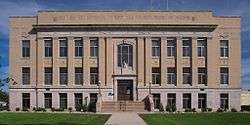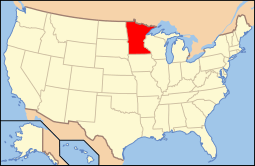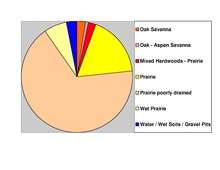Wilkin County, Minnesota
| Wilkin County, Minnesota | |
|---|---|
 The Wilkin County Courthouse in Breckenridge | |
 Location in the U.S. state of Minnesota | |
 Minnesota's location in the U.S. | |
| Founded | March 6, 1868[1] |
| Named for | Alexander Wilkin |
| Seat | Breckenridge |
| Largest city | Breckenridge |
| Area | |
| • Total | 751 sq mi (1,945 km2) |
| • Land | 751 sq mi (1,945 km2) |
| • Water | 0.2 sq mi (1 km2), 0.03% |
| Population (est.) | |
| • (2015) | 6,396 |
| • Density | 8.8/sq mi (3/km²) |
| Congressional district | 7th |
| Time zone | Central: UTC-6/-5 |
| Website |
www |
Wilkin County is a county located in the U.S. state of Minnesota. As of the 2010 census, the population of Wilkin County was 6,576.[2] Its county seat is Breckenridge.[3] The county is named for Colonel Alexander Wilkin, a lawyer who served as Minnesota’s U.S. marshal and was later killed in the Civil War.
Wilkin County is part of the Wahpeton, ND–MN Micropolitan Statistical Area, which is included in the Fargo-Wahpeton, ND-MN Combined Statistical Area.
History
Wilkin County was originally established as Toombs County on March 8, 1858, named after Robert Toombs (1810–85) of Georgia, who had been a member of Congress, 1845–53, and was U.S. senator, 1853-61. Mr. Toombs became a leading disunionist, then a Confederate secretary of state in 1861, and later was a Confederate general. In 1863, the county was renamed Andy Johnson County after President Andrew Johnson and to disassociate with Mr. Toombs. The county again changed its name to Wilkin County on March 6, 1868.
Toombs County was formed in 1858 from Pembina County. It is the parental county for Traverse County, and now are parts of Clay, Otter Tail, Grant, Stevens, Douglas and Pope counties.
Geography
According to the U.S. Census Bureau, the county has a total area of 751 square miles (1,950 km2), of which 751 square miles (1,950 km2) is land and 0.2 square miles (0.52 km2) (0.03%) is water.[4]

Lakes
- Breckenridge Lake - Breckenridge Township
Major highways
 Interstate 94
Interstate 94 U.S. Highway 52
U.S. Highway 52 U.S. Highway 75
U.S. Highway 75 Minnesota State Highway 9
Minnesota State Highway 9 Minnesota State Highway 55
Minnesota State Highway 55 Minnesota State Highway 108
Minnesota State Highway 108 Minnesota State Highway 210
Minnesota State Highway 210
Adjacent counties
- Clay County (north)
- Otter Tail County (east)
- Grant County (southeast)
- Traverse County (south)
- Richland County, North Dakota (southwest)
- Cass County, North Dakota (northwest)
Demographics
| Historical population | |||
|---|---|---|---|
| Census | Pop. | %± | |
| 1860 | 40 | — | |
| 1870 | 295 | 637.5% | |
| 1880 | 1,906 | 546.1% | |
| 1890 | 4,346 | 128.0% | |
| 1900 | 8,080 | 85.9% | |
| 1910 | 9,063 | 12.2% | |
| 1920 | 10,187 | 12.4% | |
| 1930 | 9,791 | −3.9% | |
| 1940 | 10,475 | 7.0% | |
| 1950 | 10,567 | 0.9% | |
| 1960 | 10,650 | 0.8% | |
| 1970 | 9,389 | −11.8% | |
| 1980 | 8,454 | −10.0% | |
| 1990 | 7,516 | −11.1% | |
| 2000 | 7,138 | −5.0% | |
| 2010 | 6,576 | −7.9% | |
| Est. 2015 | 6,396 | [6] | −2.7% |
| U.S. Decennial Census[7] 1790-1960[8] 1900-1990[9] 1990-2000[10] 2010-2015[2] | |||

As of the census of 2000, there were 7,138 people, 2,752 households, and 1,926 families residing in the county. The population density was 10 people per square mile (4/km²). There were 3,105 housing units at an average density of 4 per square mile (2/km²). The racial makeup of the county was 97.77% White, 0.15% Black or African American, 0.42% Native American, 0.15% Asian, 0.01% Pacific Islander, 0.49% from other races, and 0.99% from two or more races. 1.54% of the population were Hispanic or Latino of any race. 41.8% were of German and 29.2% Norwegian ancestry.
There were 2,752 households out of which 35.2% had children under the age of 18 living with them, 59.5% were married couples living together, 7.0% had a female householder with no husband present, and 30.0% were non-families. 25.9% of all households were made up of individuals and 13.40% had someone living alone who was 65 years of age or older. The average household size was 2.54 and the average family size was 3.09.
In the county the population was spread out with 27.8% under the age of 18, 7.0% from 18 to 24, 27.7% from 25 to 44, 21.5% from 45 to 64, and 16.1% who were 65 years of age or older. The median age was 38 years. For every 100 females there were 95.3 males. For every 100 females age 18 and over, there were 96.1 males.
The median income for a household in the county was $38,093, and the median income for a family was $46,220. Males had a median income of $31,273 versus $20,925 for females. The per capita income for the county was $16,873. About 6.2% of families and 8.1% of the population were below the poverty line, including 8.9% of those under age 18 and 8.3% of those age 65 or over.
Communities
Cities
- Breckenridge (county seat)
- Campbell
- Doran
- Foxhome
- Kent
- Nashua
- Rothsay (partly in Otter Tail County)
- Wolverton
Townships
Unincorporated communities
Ghost town
See also
References
- ↑ "Minnesota Place Names". Minnesota Historical Society. Retrieved March 19, 2014.
- 1 2 "State & County QuickFacts". United States Census Bureau. Retrieved September 1, 2013.
- ↑ "Find a County". National Association of Counties. Retrieved 2011-06-07.
- ↑ "2010 Census Gazetteer Files". United States Census Bureau. August 22, 2012. Retrieved October 25, 2014.
- ↑ Nelson, Steven (2011). Savanna Soils of Minnesota. Minnesota: Self. pp. 57 - 60. ISBN 978-0-615-50320-2.
- ↑ "County Totals Dataset: Population, Population Change and Estimated Components of Population Change: April 1, 2010 to July 1, 2015". Retrieved July 2, 2016.
- ↑ "U.S. Decennial Census". United States Census Bureau. Retrieved October 25, 2014.
- ↑ "Historical Census Browser". University of Virginia Library. Retrieved October 25, 2014.
- ↑ "Population of Counties by Decennial Census: 1900 to 1990". United States Census Bureau. Retrieved October 25, 2014.
- ↑ "Census 2000 PHC-T-4. Ranking Tables for Counties: 1990 and 2000" (PDF). United States Census Bureau. Retrieved October 25, 2014.
External links
 |
Cass County, North Dakota | Clay County |  | |
| |
Otter Tail County | |||
| ||||
| | ||||
| Richland County, North Dakota | Traverse County | Grant County |
Coordinates: 46°22′N 96°28′W / 46.36°N 96.47°W